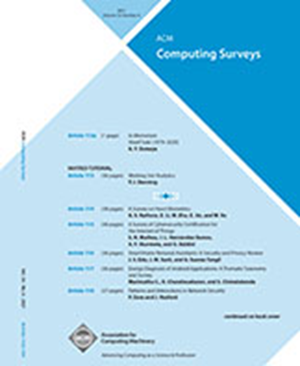The Role of the Internet of Things (IoT) in Achieving the United Nations (UN) Sustainable Development Goals (SDGs) - A Systematic Review
IF 28
1区 计算机科学
Q1 COMPUTER SCIENCE, THEORY & METHODS
引用次数: 0
Abstract
As the 2030 deadline for achieving the Sustainable Development Goals (SDGs) approaches, the Internet of Things (IoT) has become a key enabler of sustainable development. This paper presents a systematic review of IoT-SDG research from 2015–2024, mapping its applications across seven macro-sectors: health, food and agriculture, energy and environment, education and employment, industry and innovation, governance and human rights, and smart cities and smart spaces. Our analysis identifies three major trends: (i) a shift from conceptual designs to real-world deployments, including grassroots innovations in developing economies tailored to local priorities; (ii) increasing reliance on enabling technologies such as cloud, edge, and machine learning, which together enhance scalability and responsiveness; and (iii) the growing use of IoT data not only for operational efficiency, but to quantify the impact of SDG interventions and identify areas for refinement. Despite this progress, barriers remain, including limited connectivity, dependence on centralised infrastructures, and challenges of interoperability, particularly in low-resource settings. These findings underscore the need for context-specific, edge-driven architectures and scalable mobile applications that can bridge digital divides. By synthesising achievements, gaps, and future opportunities, this review offers actionable insights for policymakers, technologists, and researchers seeking to harness IoT more effectively in support of an inclusive and sustainable SDG Vision 2030.物联网(IoT)在实现联合国(UN)可持续发展目标(sdg)中的作用-系统回顾
随着2030年实现可持续发展目标的最后期限日益临近,物联网(IoT)已成为可持续发展的关键推动力。本文对2015-2024年物联网可持续发展目标研究进行了系统回顾,绘制了其在七个宏观领域的应用图:卫生、粮食与农业、能源与环境、教育与就业、产业与创新、治理与人权、智慧城市与智慧空间。我们的分析确定了三个主要趋势:(i)从概念设计转向实际部署,包括发展中经济体根据当地优先事项量身定制的基层创新;(ii)增加对云、边缘和机器学习等使能技术的依赖,这些技术共同增强了可扩展性和响应能力;(iii)越来越多地使用物联网数据,不仅是为了提高运营效率,也是为了量化可持续发展目标干预措施的影响,并确定需要改进的领域。尽管取得了这些进展,但障碍仍然存在,包括连接有限、对集中式基础设施的依赖以及互操作性的挑战,特别是在资源匮乏的环境中。这些发现强调了对能够弥合数字鸿沟的特定环境、边缘驱动架构和可扩展移动应用程序的需求。通过综合成就、差距和未来机遇,本综述为寻求更有效地利用物联网支持包容和可持续的2030年可持续发展目标愿景的政策制定者、技术专家和研究人员提供了可操作的见解。
本文章由计算机程序翻译,如有差异,请以英文原文为准。
求助全文
约1分钟内获得全文
求助全文
来源期刊

ACM Computing Surveys
工程技术-计算机:理论方法
CiteScore
33.20
自引率
0.60%
发文量
372
审稿时长
12 months
期刊介绍:
ACM Computing Surveys is an academic journal that focuses on publishing surveys and tutorials on various areas of computing research and practice. The journal aims to provide comprehensive and easily understandable articles that guide readers through the literature and help them understand topics outside their specialties. In terms of impact, CSUR has a high reputation with a 2022 Impact Factor of 16.6. It is ranked 3rd out of 111 journals in the field of Computer Science Theory & Methods.
ACM Computing Surveys is indexed and abstracted in various services, including AI2 Semantic Scholar, Baidu, Clarivate/ISI: JCR, CNKI, DeepDyve, DTU, EBSCO: EDS/HOST, and IET Inspec, among others.
 求助内容:
求助内容: 应助结果提醒方式:
应助结果提醒方式:


